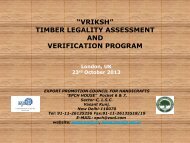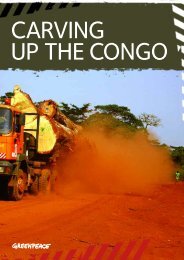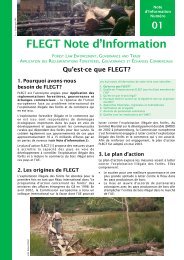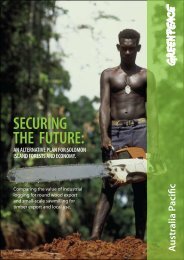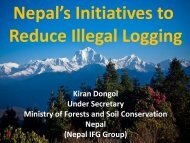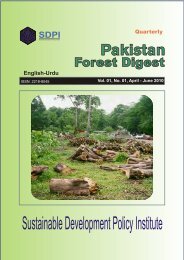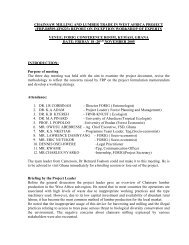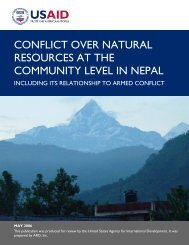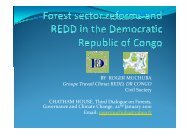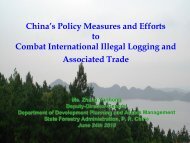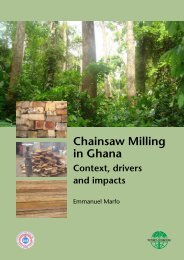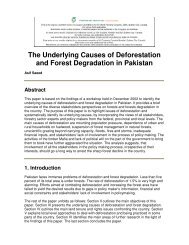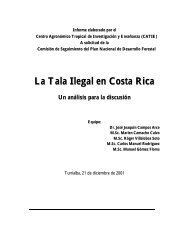download document - Rights and Resources Initiative
download document - Rights and Resources Initiative
download document - Rights and Resources Initiative
- No tags were found...
Create successful ePaper yourself
Turn your PDF publications into a flip-book with our unique Google optimized e-Paper software.
Historical <strong>and</strong> contemporary l<strong>and</strong> laws <strong>and</strong> their impact on indigenous peoples’ l<strong>and</strong> rights in Ug<strong>and</strong>a:The case of the Batwaothers that came <strong>and</strong> occupied the region later. 20 The Batwa became embroiled in conflictsamong the Batutsi <strong>and</strong> the Bahutu, in which Belgian, German <strong>and</strong> British colonial forces alsoinvolved themselves. In 1912, the British took control of Kigezi–Bufumbira <strong>and</strong> continued torule this area along with the rest of Ug<strong>and</strong>a until 1962, when Ug<strong>and</strong>a gained herindependence. 21The Batwa fall into the category described by Article 1 of the International Labour Organisation(ILO) Convention 169, which spells out the definition of tribal <strong>and</strong> indigenous people. TheConvention applies to:(a) Tribal peoples in independent countries whose social, cultural <strong>and</strong> economicconditions distinguish them from other sections of the national community, <strong>and</strong> whosestatus is regulated wholly or partially by their own customs or traditions or by special lawsor regulations;(b) Peoples in independent countries who are regarded as indigenous on account of theirdescent from the populations which inhabited the country, or a geographical region towhich the country belongs, at the time of conquest or colonisation or the establishment ofpresent State boundaries <strong>and</strong> who, irrespective of their legal status, retain some or all oftheir own social, economic, cultural <strong>and</strong> political institutions.It further provides that self-identification as indigenous or tribal shall be regarded as afundamental criterion for determining the groups to which the provisions of this Conventionapply.The Batwa are aptly described by both of these clauses. They maintain that they are the firstinhabitants of the areas they occupy, <strong>and</strong> that the communities that have come recently to livethere, including the Tutsi <strong>and</strong> Bakiga, have their origins outside this area, the majority havingmigrated from Rw<strong>and</strong>a. 22 The Batwa insist that, unlike these other tribes, they have no originselsewhere, no immigration history, that they are truly the indigenous people of the area <strong>and</strong> arethus the rightful inhabitants of the forest areas of Central Africa, including the Echuya, Bwindi<strong>and</strong> Mgahinga forests of south-western Ug<strong>and</strong>a. 23A recent study by Kabananukye 24 calculates the Batwa population in Ug<strong>and</strong>a as 5,591;0.0286% of the country’s total population. According to the Ug<strong>and</strong>a Bureau of Statistics’ mostrecent census (2002), the majority of the Batwa live in south-western Ug<strong>and</strong>a, in the sixdistricts of Kisoro, Bushenyi, Kabale, Kanungu, Mubende <strong>and</strong> Rukungiri, with the populationin each district ranging between 366 <strong>and</strong> 935. Kisoro district has the largest Batwa population(935), followed by Bushenyi (779). The rest are scattered thinly in all districts of Ug<strong>and</strong>a. 25 Thisdispersion has worked against the solidarity of the Batwa <strong>and</strong> has been a contributory factor tothe weakness of their voice in dem<strong>and</strong>ing l<strong>and</strong> rights <strong>and</strong> an end to unlawful evictions.20 Ibid.21 Ibid.22 Kingdom (1990), p 248.23 Lewis (2000), p 14.24 Kabananukye (2006), p 11.25 Ibid. The same is also reflected by the Ug<strong>and</strong>a Bureau of Statistics.Nakayi 4January 2009



